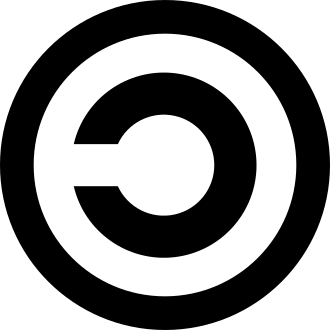Copyleft

Copyleft is an innovative and deliberate use of the principles of copyright to ensure that derivative works of a piece of software or other works are released under the same copyleft terms. Rather than restricting the use and modification of copyrighted materials, copyleft ensures an open platform wherein materials can be freely used and altered, provided any derivative works maintain the same permissions.
History[edit]
The term "copyleft" traces its origin to a witty deviation from "copyright" and initially referred to the licensing terms of the GNU General Public License developed by Richard Stallman as part of the Free Software Foundation. The concept evolved when Stallman encountered a situation with Symbolics over modifications to a Lisp interpreter. Stallman had given a public domain version of his work to Symbolics. However, when he sought to access the improvements made by Symbolics, they declined. This led Stallman to create a license in 1984 to prevent such "software hoarding" activities. The idea of "copyleft" was further popularized by a note in Tiny BASIC, developed by Dr. Wang in the late 1970s, which carried the phrases "All Wrongs Reserved" and "CopyLeft."
Principles[edit]
Copyleft licensing provides an irrevocable license to any recipient of a work, granting permission for:
- Unlimited use
- Modification
- Redistribution (even for profit, under certain conditions)
However, any distributed modifications must retain the same licensing terms and be available in a modifiable form, ensuring openness.
Types of Copyleft[edit]
- Strong Copyleft: Requires that all derivative works be distributed under the same copyleft licensing. Example: GNU General Public License.
- Weak Copyleft: Allows some derivative works to be released under a different license, often used for software libraries. Examples: GNU Lesser General Public License, Mozilla Public License.
Copyleft in Other Fields[edit]
While primarily used in software, the philosophy of copyleft has transcended to other domains:
- Arts: Movements like the Libre Society and open-source record labels.
- Documentation: Such as the GNU Free Documentation License, used for Wikimd content.
- Creative Works: Creative Commons ShareAlike licenses.
Controversies and Debates[edit]
Copyleft has been at the center of numerous debates, especially concerning its "viral" nature, which mandates derivative works to also be under copyleft. Critics, including tech giants like Microsoft, liken it to a virus, given its self-replicating nature. However, advocates counter this by emphasizing that users are fully aware and accepting of these terms, unlike malicious software.
The perpetual debate revolves around the definition of "freedom." Some argue copyleft licenses prioritize collective freedom, ensuring future recipients have the same rights (freedom from proprietary constraints). In contrast, non-copyleft licenses emphasize the immediate freedom of the first recipient (freedom to create proprietary works).
Impact[edit]
Copyleft has several notable effects:
- Preventing Fragmentation: Copylefted projects, like Linux, have experienced less fragmentation than non-copyleft projects. The openness leads to a collaborative improvement rather than isolated versions.
- Encouraging Collaboration: The open nature of copyleft promotes collaborative work, pooling resources, and ideas for the betterment of the project.
See Also[edit]
References[edit]
<references />
| This article is a stub. You can help WikiMD by registering to expand it. |
Ad. Transform your life with W8MD's Budget GLP-1 injections from $75


W8MD offers a medical weight loss program to lose weight in Philadelphia. Our physician-supervised medical weight loss provides:
- Weight loss injections in NYC (generic and brand names):
- Zepbound / Mounjaro, Wegovy / Ozempic, Saxenda
- Most insurances accepted or discounted self-pay rates. We will obtain insurance prior authorizations if needed.
- Generic GLP1 weight loss injections from $75 for the starting dose.
- Also offer prescription weight loss medications including Phentermine, Qsymia, Diethylpropion, Contrave etc.
NYC weight loss doctor appointmentsNYC weight loss doctor appointments
Start your NYC weight loss journey today at our NYC medical weight loss and Philadelphia medical weight loss clinics.
- Call 718-946-5500 to lose weight in NYC or for medical weight loss in Philadelphia 215-676-2334.
- Tags:NYC medical weight loss, Philadelphia lose weight Zepbound NYC, Budget GLP1 weight loss injections, Wegovy Philadelphia, Wegovy NYC, Philadelphia medical weight loss, Brookly weight loss and Wegovy NYC
|
WikiMD's Wellness Encyclopedia |
| Let Food Be Thy Medicine Medicine Thy Food - Hippocrates |
Medical Disclaimer: WikiMD is not a substitute for professional medical advice. The information on WikiMD is provided as an information resource only, may be incorrect, outdated or misleading, and is not to be used or relied on for any diagnostic or treatment purposes. Please consult your health care provider before making any healthcare decisions or for guidance about a specific medical condition. WikiMD expressly disclaims responsibility, and shall have no liability, for any damages, loss, injury, or liability whatsoever suffered as a result of your reliance on the information contained in this site. By visiting this site you agree to the foregoing terms and conditions, which may from time to time be changed or supplemented by WikiMD. If you do not agree to the foregoing terms and conditions, you should not enter or use this site. See full disclaimer.
Credits:Most images are courtesy of Wikimedia commons, and templates, categories Wikipedia, licensed under CC BY SA or similar.
Translate this page: - East Asian
中文,
日本,
한국어,
South Asian
हिन्दी,
தமிழ்,
తెలుగు,
Urdu,
ಕನ್ನಡ,
Southeast Asian
Indonesian,
Vietnamese,
Thai,
မြန်မာဘာသာ,
বাংলা
European
español,
Deutsch,
français,
Greek,
português do Brasil,
polski,
română,
русский,
Nederlands,
norsk,
svenska,
suomi,
Italian
Middle Eastern & African
عربى,
Turkish,
Persian,
Hebrew,
Afrikaans,
isiZulu,
Kiswahili,
Other
Bulgarian,
Hungarian,
Czech,
Swedish,
മലയാളം,
मराठी,
ਪੰਜਾਬੀ,
ગુજરાતી,
Portuguese,
Ukrainian